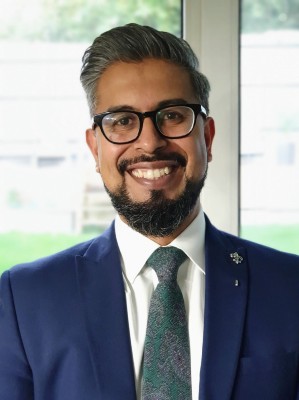Thu 13 Oct 2022

Sal Naseem, Regional Director for London at the Independent Office for Police Conduct, on gender equity in the force and turning good intentions into action
By Murielle Gonzalez
Sal Naseem, Regional Director for London at the Independent Office for Police Conduct (IOPC), is passionate that policing is a public service that needs to represent the community it serves and admits the conversation around gender equity in the force is close to his heart. "It's not just about gender equity for women, but also about all the other protected characteristics," he says. "Policing only works if it has the consent of the community to police it, so it is about making sure representation and the statistics match up," he adds.
His statement comes at a time the conference Women in Policing fast approaches. Taking place in London on 16 November, the event will celebrate the achievements of female leaders in the force, creating a platform for open conversations about the challenges facing women in law enforcement. Together with inspirational speakers, delegates will learn about the best approaches to breaking down the barriers that prohibit female leadership. Naseem (pictured below) will take to the stage, reflecting on engaging male colleagues as allies.
Female leaders in policing
Female representation in the police force is gaining momentum. The latest data on the police workforce (released by the Home Office early this year) shows that, as of 31 March 2021, there were 43,762 female police officers in the 43 police forces across England and Wales, making up 32.4%. The representation is up one percentage point from the previous year.
"If you look at Chief Constables and the representation of women at the most senior rank of policing, you can see some milestones continuing to be broken," Naseem points out.
Chief Constable Pippa Mills of West Mercia Police and Chief Constable Debbie Tedds of Warwickshire Police are two of the latest women breaking down barriers, following in the footsteps of Britain's first female Chief Constable at Lancashire Constabulary, Pauline Clare, who took on the job in 1995.
"Women are a crucial component at all ranks of policing," says Naseem, noting that organisations need to appreciate the benefits that cognitive diversity can bring. "This is almost hard for me to say because it's such a given and an absolute truth today, but in times gone by, it wasn't. Women had to fight for their place."
To Naseem, the latest figures paint a positive picture, showing women who are entering the vocation of policing that female leadership in the force is possible. "We have better gender representation at the most senior ranks because of the sacrifices of women who came before them," he notes. "Everybody stands on the shoulder of giants," he adds.
 It's not easy
It's not easy
As regional director for London at the IOPC, Naseem deals with issues of police misconduct, often looking at the most serious and sensitive cases. With his professional life, coupled with his work on equity, diversity and inclusion, he is focused on ensuring the community has an effective police complaint system and is working to narrow the confidence gap between marginalised groups and policing.
"It is important to acknowledge that what I see at work is some of the more severe challenges facing women in policing," explains Naseem, noting those issues are pinned back to culture.
"Sadly, we see issues of discrimination aimed at women alongside other protected characteristics. This is an area that the IOPC has looked into closely. In 2020, the IOPC launched Operation Hotton, subsequently publishing a learning report with 15 recommendations for the Metropolitan Police Service. As part of that operation, the IOPC found evidence of discrimination, misogyny, harassment and bullying, involving officers predominantly based at Charing Cross Police Station.
"We realised this is not just an issue related to one force, and it is important to recognise that authorities took on board the recommendations, rolling them out to the 43 police forces across England and Wales, with the National Police Chiefs Council committed to doing exactly that," explains Naseem.
Following on from the analysis of microaggressions and exclusions identified in the report, Naseem can't help but feel familiar with the challenges in his own experience as a person of colour. "When you come from a minority group as I am, you can understand what those challenges feel like," he says.
Allies come in
Very often, microaggressions and exclusions against women happen in front of colleagues. "That's where my passionate advocacy of allyship comes in," says Naseem, noting allies are a crucial component to being part of the solution.
"For somebody who comes from a minority group as I am, you're not just watching something happen; you're being an upstander," says Naseem. "But when you lend your voice to call out something that's not necessarily your cause, that action becomes powerful. That's why I believe in male allyship," he adds.
Speaking at Women in Policing, Naseem will present his views on what it takes to become an ally on the gender equity front and how his lived experience has influenced his understanding of the challenges women face. "Allyship involves the understanding of the issues in the first place, but also the honest conversations about what you don't know," he points out.
Naseem's presentation will raise the question of how organisations practice the notion of allyship and how every individual plays a part in turning good intentions into action. "It comes down to a simple concept, but one that is difficult to deliver, and that is leadership," he says. "You need sincere, authentic, intentional leadership. If you do the work to create an inclusive culture, then women benefit, but everybody benefits as well," he concludes.
Women in Policing takes place in London on 16 November. Visit the event website for the full agenda.
Register online.
ABOUT THE AUTHOR
Murielle Gonzalez, content strategy manager at Dods Diversity & Inclusion, is an experienced journalist and editor. She can be reached on murielle.gonzalez@dodsgroup.com.
View all news